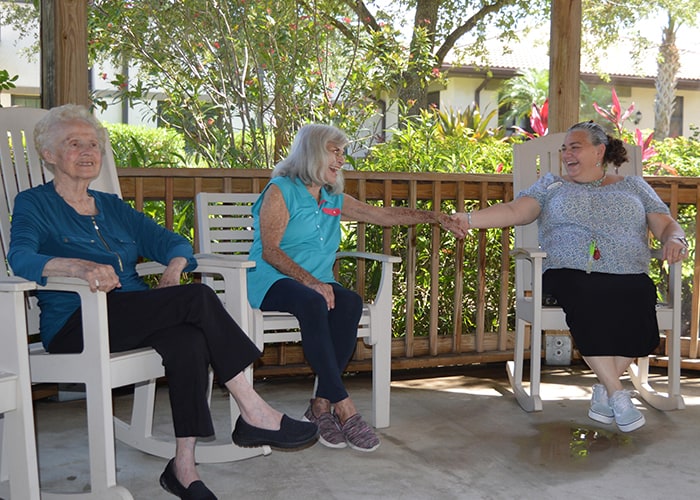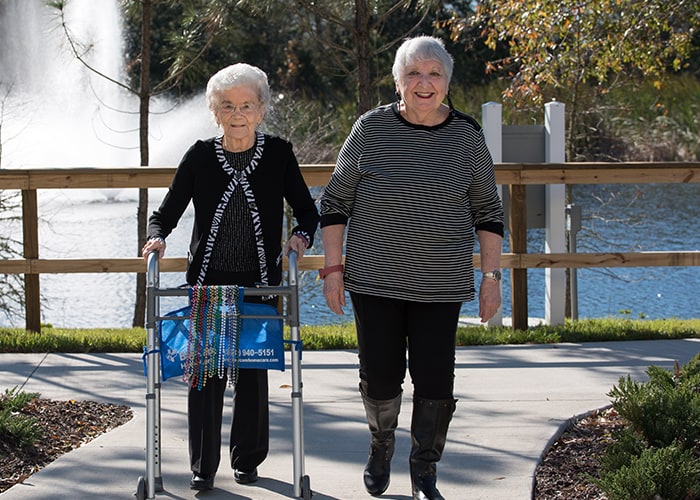As we age, stress can become a more prominent part of our lives. The demands of daily life, health concerns, and adapting to changes can all contribute to increased stress levels. April, being Stress Awareness Month, is an opportune time to shed light on the importance of managing stress and providing seniors with tools to combat it effectively. In this blog post, we will delve into the topic of stress in seniors and explore various strategies to help them combat stress and improve their overall well-being.
Understanding Stress in Seniors
Stress affects people of all ages, but it can have unique implications for seniors. The aging process itself can bring about physical and mental changes that may make individuals more susceptible to stress. Certain life events, such as retirement, the loss of a loved one, or transitioning into assisted living, can also contribute to heightened stress levels. It is essential to recognize the signs of stress in seniors, which may include:
- Increased irritability or mood swings
- Difficulty sleeping or changes in appetite
- Fatigue or lack of motivation
- Physical symptoms such as headaches or muscle tension
- Withdrawing from social activities and relationships
Combatting Stress in Seniors
Fortunately, there are several strategies seniors can employ to combat stress and improve their overall well-being effectively.
- Exercise and Physical Activity: Engaging in regular exercise can help reduce stress levels and improve mood. Seniors can consider activities such as walking, swimming, yoga, or tai chi. These low-impact exercises not only help relieve stress but also contribute to maintaining physical health and flexibility.
- Social Engagement: Maintaining social connections is vital for seniors’ mental well-being. Strengthening relationships with family and friends, joining community groups or clubs, or participating in volunteer work are all excellent ways to combat stress and enhance social support networks.
- Practicing Relaxation Techniques: Encouraging seniors to practice relaxation techniques such as deep breathing exercises, meditation, or engaging in hobbies they enjoy can be extremely beneficial. These activities can help seniors focus on the present moment, reduce anxiety, and promote a sense of calmness.
- Seeking Support: Encouraging seniors to reach out for support is crucial. Whether it is a trusted friend, family member, or professional counselor, having someone to talk to can provide an outlet for stress management and assist in finding effective coping strategies.
- Maintaining a Balanced Lifestyle: Establishing a well-rounded routine that includes healthy eating habits, regular sleep patterns, and time for leisure activities is essential for seniors. Encouraging them to engage in hobbies or pursue new interests can provide a sense of fulfillment and reduce stress levels.
- Utilize Technology: Introducing seniors to technology can offer them opportunities for stress reduction. From meditation apps to video calls with loved ones, technology can help seniors connect, relax, and engage in activities that contribute to stress relief. Sure! Here are additional paragraphs to expand on the topic:
- Prioritizing Self-Care: Self-care is crucial for managing stress in seniors. Encourage them to prioritize their own needs and engage in activities that bring them joy and relaxation. This can include taking a warm bath, reading a book, listening to soothing music, or indulging in a favorite hobby. Reminding seniors that it is okay to take time for themselves will help them reduce stress and improve their overall well-being.
- Eating a Healthy Diet: A well-balanced diet plays a significant role in managing stress levels. Encourage seniors to consume nutritious foods that support mental and physical health. Foods rich in antioxidants, such as fruits and vegetables, can help combat the negative effects of stress on the body. Additionally, reducing the intake of caffeine and sugar can prevent energy crashes and promote better sleep quality, which in turn reduces stress.
- Engaging in Mindfulness Activities: Mindfulness practices can be highly effective in managing stress. Seniors can benefit from activities such as mindful breathing, guided imagery, or journaling. These techniques help bring attention to the present moment, promote relaxation, and reduce anxiety. Encourage seniors to incorporate these practices into their daily routine to reap the benefits of mindfulness.
- Getting Sufficient Rest: Adequate sleep is essential for managing stress and promoting overall well-being. Encourage seniors to establish a regular sleep schedule and create a relaxing bedtime routine to improve sleep quality. Promoting a comfortable sleep environment and avoiding stimulating activities close to bedtime will help seniors achieve better rest and wake up feeling refreshed.
- Supporting Emotional Well-being: It’s important to acknowledge the emotional aspect of stress in seniors. Encourage them to express and manage their emotions in healthy ways, whether through talking with a supportive friend or family member, engaging in creative outlets such as painting or writing, or seeking professional counseling if needed. Assure seniors that their emotions are valid and that there are resources available to help.
- Practicing Time Management: Seniors often have various commitments and responsibilities. Teaching them effective time management skills can reduce stress and increase productivity. Promote the use of calendars, to-do lists, or digital reminders to help seniors stay organized and prioritize tasks. Breaking down larger tasks into smaller, more manageable steps can alleviate feelings of overwhelm and promote a sense of accomplishment.
- Taking Regular Breaks: Encourage seniors to take regular breaks throughout the day, especially when engaged in mentally or physically demanding activities. Encourage short walks, stretching exercises, or simply finding a quiet space to relax and recharge. Regular breaks help prevent burnout, reduce stress levels, and increase overall productivity.
- Staying informed about community resources: Make sure seniors are aware of the various resources available within their community, such as support groups, senior centers, or wellness programs. These resources can provide valuable information, social support, and opportunities for engaging in stress-reducing activities. Encourage seniors to explore and utilize these resources that can contribute to their well-being.
Live Stress-Free at Inspired Living
Stress doesn’t have to be a constant companion for seniors. By raising awareness during Stress Awareness Month and implementing effective stress management strategies, we can help seniors improve their overall well-being. At Inspired Living we encourage our residents to engage in physical activity, maintain social connections, practice relaxation techniques, seek support, maintain a balanced lifestyle, and much more. We invite you to take a tour of one of our communities to learn more about how it can be the best decision for you or your loved one.


























